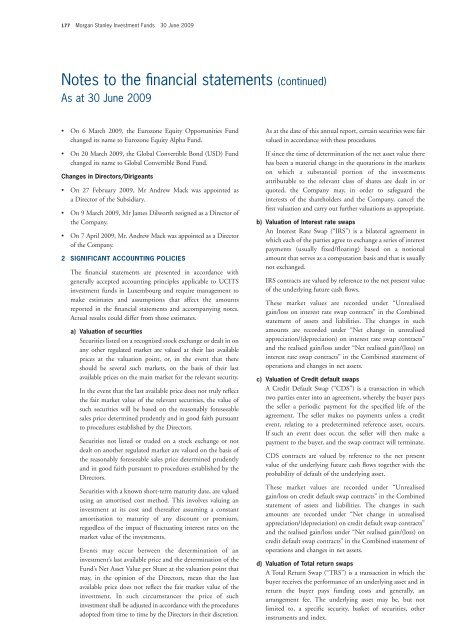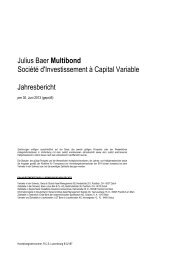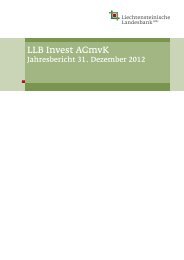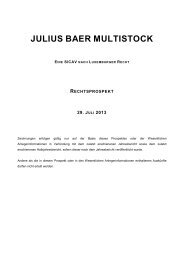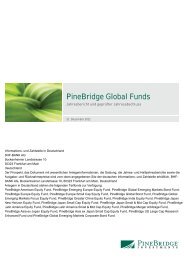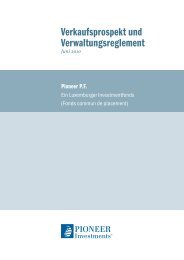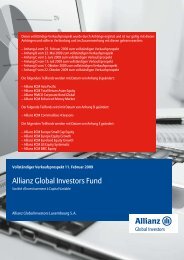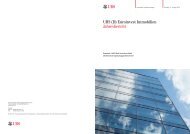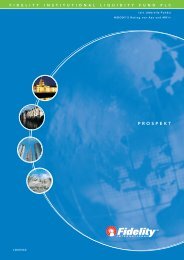Morgan Stanley Investment Funds - stockselection
Morgan Stanley Investment Funds - stockselection
Morgan Stanley Investment Funds - stockselection
You also want an ePaper? Increase the reach of your titles
YUMPU automatically turns print PDFs into web optimized ePapers that Google loves.
177 <strong>Morgan</strong> <strong>Stanley</strong> <strong>Investment</strong> <strong>Funds</strong> 30 June 2009<br />
Notes to the financial statements (continued)<br />
As at 30 June 2009<br />
• On 6 March 2009, the Eurozone Equity Opportunities Fund<br />
changed its name to Eurozone Equity Alpha Fund.<br />
• On 20 March 2009, the Global Convertible Bond (USD) Fund<br />
changed its name to Global Convertible Bond Fund.<br />
Changes in Directors/Dirigeants<br />
• On 27 February 2009, Mr Andrew Mack was appointed as<br />
a Director of the Subsidiary.<br />
• On 9 March 2009, Mr James Dilworth resigned as a Director of<br />
the Company.<br />
• On 7 April 2009, Mr. Andrew Mack was appointed as a Director<br />
of the Company.<br />
2 SIGNIFICANT ACCOUNTING POLICIES<br />
The financial statements are presented in accordance with<br />
generally accepted accounting principles applicable to UCITS<br />
investment funds in Luxembourg and require management to<br />
make estimates and assumptions that affect the amounts<br />
reported in the financial statements and accompanying notes.<br />
Actual results could differ from those estimates.<br />
a) Valuation of securities<br />
Securities listed on a recognised stock exchange or dealt in on<br />
any other regulated market are valued at their last available<br />
prices at the valuation point, or, in the event that there<br />
should be several such markets, on the basis of their last<br />
available prices on the main market for the relevant security.<br />
In the event that the last available price does not truly reflect<br />
the fair market value of the relevant securities, the value of<br />
such securities will be based on the reasonably foreseeable<br />
sales price determined prudently and in good faith pursuant<br />
to procedures established by the Directors.<br />
Securities not listed or traded on a stock exchange or not<br />
dealt on another regulated market are valued on the basis of<br />
the reasonably foreseeable sales price determined prudently<br />
and in good faith pursuant to procedures established by the<br />
Directors.<br />
Securities with a known short-term maturity date, are valued<br />
using an amortised cost method. This involves valuing an<br />
investment at its cost and thereafter assuming a constant<br />
amortisation to maturity of any discount or premium,<br />
regardless of the impact of fluctuating interest rates on the<br />
market value of the investments.<br />
Events may occur between the determination of an<br />
investment’s last available price and the determination of the<br />
Fund’s Net Asset Value per Share at the valuation point that<br />
may, in the opinion of the Directors, mean that the last<br />
available price does not reflect the fair market value of the<br />
investment. In such circumstances the price of such<br />
investment shall be adjusted in accordance with the procedures<br />
adopted from time to time by the Directors in their discretion.<br />
As at the date of this annual report, certain securities were fair<br />
valued in accordance with these procedures.<br />
If since the time of determination of the net asset value there<br />
has been a material change in the quotations in the markets<br />
on which a substantial portion of the investments<br />
attributable to the relevant class of shares are dealt in or<br />
quoted, the Company may, in order to safeguard the<br />
interests of the shareholders and the Company, cancel the<br />
first valuation and carry out further valuations as appropriate.<br />
b) Valuation of Interest rate swaps<br />
An Interest Rate Swap (“IRS”) is a bilateral agreement in<br />
which each of the parties agree to exchange a series of interest<br />
payments (usually fixed/floating) based on a notional<br />
amount that serves as a computation basis and that is usually<br />
not exchanged.<br />
IRS contracts are valued by reference to the net present value<br />
of the underlying future cash flows.<br />
These market values are recorded under “Unrealised<br />
gain/loss on interest rate swap contracts” in the Combined<br />
statement of assets and liabilities. The changes in such<br />
amounts are recorded under “Net change in unrealised<br />
appreciation/(depreciation) on interest rate swap contracts”<br />
and the realised gain/loss under “Net realised gain/(loss) on<br />
interest rate swap contracts” in the Combined statement of<br />
operations and changes in net assets.<br />
c) Valuation of Credit default swaps<br />
A Credit Default Swap (“CDS”) is a transaction in which<br />
two parties enter into an agreement, whereby the buyer pays<br />
the seller a periodic payment for the specified life of the<br />
agreement. The seller makes no payments unless a credit<br />
event, relating to a predetermined reference asset, occurs.<br />
If such an event does occur, the seller will then make a<br />
payment to the buyer, and the swap contract will terminate.<br />
CDS contracts are valued by reference to the net present<br />
value of the underlying future cash flows together with the<br />
probability of default of the underlying asset.<br />
These market values are recorded under “Unrealised<br />
gain/loss on credit default swap contracts” in the Combined<br />
statement of assets and liabilities. The changes in such<br />
amounts are recorded under “Net change in unrealised<br />
appreciation/(depreciation) on credit default swap contracts”<br />
and the realised gain/loss under “Net realised gain/(loss) on<br />
credit default swap contracts” in the Combined statement of<br />
operations and changes in net assets.<br />
d) Valuation of Total return swaps<br />
A Total Return Swap (“TRS”) is a transaction in which the<br />
buyer receives the performance of an underlying asset and in<br />
return the buyer pays funding costs and generally, an<br />
arrangement fee. The underlying asset may be, but not<br />
limited to, a specific security, basket of securities, other<br />
instruments and index.


